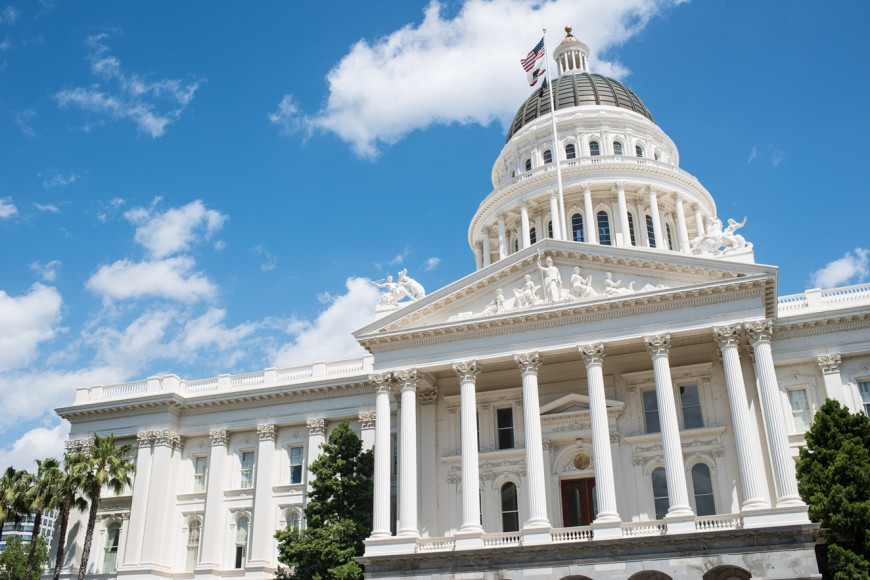Passed in 2023, the Climate Corporate Data Accountability Act (SB 253) and the Climate-Related Financial Risk Act (SB 261) were viewed as groundbreaking legislation in the United States and around the world. Despite challenges to the legislation, changes in geopolitical pressures, and the latest from the European Union’s Omnibus I package, California has remained steadfast in their commitment to ensuring companies consider and disclose climate-related matters starting in 2026. Understanding these regulations and their evolving timelines is crucial for compliance and strategic planning.
Summarizing California’s Key Climate Acts
SB 253: The Climate Corporate Data Accountability Act
This act mandates that public and private companies doing business in California with total annual revenues exceeding $1 billion USD report their greenhouse gas (GHG) emissions in accordance with the GHG Protocols.
- Initial Reporting (2026): Companies must publish their annual Scope 1 and 2 emissions beginning with fiscal year 2025 data and undergo third-party, limited assurance.
- Scope 3 Inclusion (2027): Emissions reporting expands to include Scope 3 emissions for fiscal year 2026 data. Importantly, SB 253 currently provides a safe harbor for good-faith misstatements through 2030.
- Enhanced Assurance (2030): By 2030, Scope 1 and 2 emissions will transition to reasonable assurance, while Scope 3 is anticipated to move to limited assurance.
- Timeline for Disclosure: To be determined by CARB at a later time.
SB 261: The Climate-Related Financial Risk Act
This act requires public and private companies doing business in California with total revenues exceeding $500 million USD to biennially disclose their climate-related financial risks.
- Framework: These disclosures must follow the Task Force on Climate-Related Financial Disclosures (TCFD) framework or its successors, such as the International Financial Reporting Standards (IFRS) Sustainability Standards, specifically "IFRS S2".
- Timeline for Disclosure: January 1, 2026
- Public Docket: Opens on December 1, 2025 and will close July 1, 2026.
SB 219: Greenhouse gases: climate corporate accountability: climate-related financial risk
This bill was introduced in September 2024, providing an extension for CARB to finalize and adopt the new rules for both SB 253 and SB 261 in July 2025. The bill also streamlines SB 253 reporting requirements for parent companies, removing the requirement for subsidiaries to file separate reports.
Latest Developments and Global Influence
On May 29, 2025, the California Air Resources Board (CARB) hosted a virtual workshop to discuss the implementation of SB 253 and SB 261, as well as the amendments under SB 219. During the workshop, State Senators Scott Weiner and Henry Stern acknowledged the global influence of similar disclosure regulations, such as the EU’s Corporate Sustainability Reporting Directive (CSRD), but reiterated that the compliance deadlines for California’s bills remain unchanged.
CARB presented initial concepts regarding definitions for "doing business in California," "revenue," and "corporate relationships". However, CARB also indicated that more time is needed to finalize their proposed rules and that meeting the July 1 deadline presented in SB 219 would be unlikely. A notable point from the workshop was CARB’s reminder about a December 2024 Enforcement Notice: reporting entities will not be subject to penalties for incomplete disclosures related to SB 253, provided they demonstrate "good faith efforts" to collect GHG emissions data.
In a similar fashion, on July 1, 2025, the European Financial Reporting Advisory Group (EFRAG) announced that they would also extend their public consultation period from the end of July through the end of September, extending the revision and simplification deadline of the European Sustainability Reporting Standards (ESRS) until November 30, 2025. It is yet to be seen if the delay for the updated ESRS will have further impact on the status of the California rules.
On July 9th, CARB released a Frequently Asked Questions Related to Regulatory Development and Initial Reports. The document provides insights on the regulatory developments and the anticipated submittal process for the initial disclosures. While the document does not have the force of law, it is intended to help entities prepare for compliance with the SB 253 and SB 261.
CARB posted their latest staff concept for “doing business in California” which would apply for private and public entities that meet at least one of the following criteria:
- The entity is organized or commercially domiciled in the State
- Total sales over $735,019 of the reporting year
- Real and tangible property in the state over $73,502 or 25% of the entity’s property
- Wages paid over $73,502 or 25% of the total compensation paid by the entity
SB 253: The timeline for emissions disclosure and verification remains to be determined, though the requirements remain in effect beginning in 2026.
SB 261: CARB continues to solicit feedback on the extent of reporting climate-related financial risks, acknowledging the timeline for collecting the information is often tied to financial years, and would be difficult to achieve by January 1. As a result, CARB acknowledges it is reasonable to expect the first year reports – those submitted by January 1, 2026 – may cover fiscal years 2024 or 2025, depending on the organization so long as it is done so in “good faith.” It does not, however, grant this as a permanent resolution but anticipates that future regulations may establish additional or alternative requirements. CARB has also introduced a public docket for covered entities to begin posting their reports which will open on December 1, 2025.
The California rulemaking process is comprehensive, offering opportunities for public engagement and compliance reviews. CARB remains in the "Pre-Rulemaking" stage and intends to continue public engagement before issuing proposed regulations. Once the proposed rules are ready, CARB will enter the "Formal Rulemaking" status, with one year to finalize and adopt the rules into law. This means that the final rules might not be ready until late 2026.
Preparing for Compliance: Actionable Steps
Despite the delayed release of formal guidance materials, the statutory deadlines for these regulations remain in effect. Therefore, companies, especially those new to GHG emissions inventories and/or climate-related risk reporting, should begin preparations as soon as possible.
Here are key areas your organization should focus on:
- Climate Risk Assessment:
- Evaluate your climate-related financial risks.
- Prepare to report your findings following the foundational principles of the TCFD or IFRS frameworks.
- GHG Inventory Development:
- Develop a comprehensive Inventory Management Plan.
- Calculate your Scope 1 and 2 GHG emissions for fiscal year 2025.
- Assurance Planning:
- Engage with third-party assurance providers.
- Plan for limited assurance of your GHG Inventory.
- Reporting Strategy:
- Actively monitor CARB and other regulatory bodies for further disclosure developments.
- Establish a robust reporting strategy that prioritizes data collection, internal controls, and strong governance structures to ensure readiness and compliance.
Key Deadlines at a Glance:
| SB 253 | SB 261 | |
| Key Deadlines | 2026, exact date undefined | January 1, 2026 |
| Frequency | Annual | Biennial |
| Scope | U.S. companies that do business in California and have annual revenues > $1 B USD. |
U.S. companies that do business in California and have annual revenues > $500 M USD. |
| Obligations | 2026: Scope 1 and 2 emissions for Fiscal Year 2025, with limited assurance. 2027: Expands to include Scope 3 emissions for Fiscal Year 2026 under a safe harbor provision through 2030. 2030: Scope 1 and 2 transition to reasonable assurance. Scope 3 anticipated to undergo limited assurance. |
Publication of climate-related financial risk report (TCFD or successor) leveraging either FY2024 or FY2025 data in "good faith." |
The evolving landscape of climate corporate accountability demands proactive engagement. Antea Group is here to help your organization navigate these complex regulations and build a resilient sustainability reporting framework.
Is your company prepared for California's new climate disclosure mandates?
Learn how Antea Group can support your compliance journey and enhance your sustainability reporting: https://us.anteagroup.com/services/corporate-sustainability-reporting-and-disclosure
Want more news and insights like this?
Stay in the loop with our monthly e-newsletter, The New Leaf. We’re here to keep you informed, enlightened, and entertained with the latest in EHS and sustainability. Don’t miss out on the insights and stories that matter to you!✨ Ready to turn over a new leaf? Sign up now!




